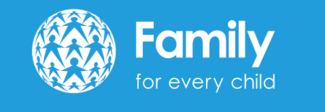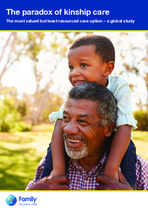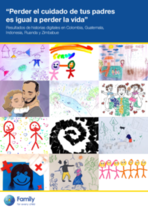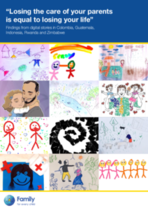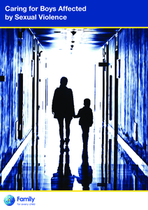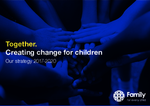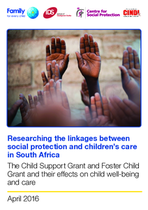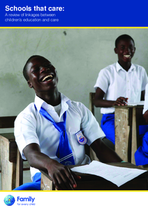Family for Every Child is a global network of local and national civil society organisations working together to improve the lives of vulnerable children around the world and supporting children to grow up in caring families, safe from exploitation and abuse.
Members include:
- KoRoot (South Korea)
- Zefie (Germany)
- Legal Services for Children (USA)
- 100% Mamans (Morocco)
- Children Assistance Program (CAP) (Liberia)
- Mulberry Bush (UK)
- Enfoque Niñez (Paraguay)
- Paicabi (Chile)
- Voice of Children (Nepal)
- Center for the Prevention and Treatment of Child Sexual Abuse (CPTCSA) (Philippines)
- CONACMI (Guatemala)
- Community Based Rehabilitation Jamaica (Jamaica)
- First Step Cambodia (FSC) (Cambodia)
- Hayat Sende Derneği (Turkey)
- Naba’a (Lebanon)
- Undugu Society of Kenya (USK) (Kenya)
- Children in Distress Network (CINDI) (South Africa)
- Jordan River Foundation (Jordan)
- Taller de Vida (Colombia)
- ChildLink (Guyana)
- Forum on Sustainable Child Empowerment (FSCE) (Ethiopia)
- Challenging Heights (Ghana)
- Uyisenga Ni Imanzi (Rwanda)
- Projeto Legal (Brazil)
- Partnership for Every Child (P4EC) Russia (Russia)
- Hope Village Society (Egypt)
- Muhammadiyah (Indonesia)
- Butterflies (India)
- Associação Brasileira Terra dos Homens (ABTH) (Brazil)
- JUCONI (Mexico)
- Semya Kazhdomu Rebenku (Kyrgyzstan)
- Farm Orphan Support Trust (FOST) (Zimbabwe)
Where they operate
Organization Type
Main Areas of Work
What They Do
Family for Every Child supports hundreds of thousands of children and families around the world by taking locally-led action in our communities. Underpinned by our experience of working on the front line, we also develop research, exchange practice, help in crises, and campaign for rights around the world.
Organization Resources
In this podcast series, Family for Every Child's CEO, Amanda Griffith, holds conversations with Members of the Family for Every Child Alliance to explore the topic of Care during COVID-19.
This Practitioner Guidance Paper shares the different approaches taken by three Family for Every Child Members to mitigate this disruption: moving to online learning for unaccompanied minors with METAdrasi in Greece; using the radio to provide far-reaching lessons with FOST in Zimbabwe; and engaging parents in their children's education using a socially-distanced homework collection system with CAP Liberia.
This report from Family for Every Child examines the growing use of kinship care, including its value and support needs for safe and effective use. The report argues that there is an urgent need to increase support to children living with relatives or friends of their family, with key recommendations made for national governments, donors and UN agencies.
This report explores what family means to children and adults in five countries using the digital storytelling technique.
Family for Every Child has shared three pre-recorded presentations to watch in advance of their Online Event on Kinship Care in Brazil on Wednesday 3 April at 13:00 UK time.
Family for Every Child examined the critical issue of sexual violence affecting boys through this global scoping study, Caring for Boys Affected by Sexual Violence.
This document describes the 2017-2020 strategy of Family For Every Child. The Strategy paper highlights the mission and vision of Family For Every Child, provides examples of past work and key lessons, and describes its approach and goals to create change toward better care for children.
This report presents research on the impact of two cash transfer programs for vulnerable children in South Africa on children’s care.
This report presents the key findings of a scoping study on the links between education and children’s care. The study involved a literature review in English, French and Spanish; key informant interviews; and consultations with 170 children, carers, teachers and other stakeholders in Guyana, India, Russia and Rwanda.

